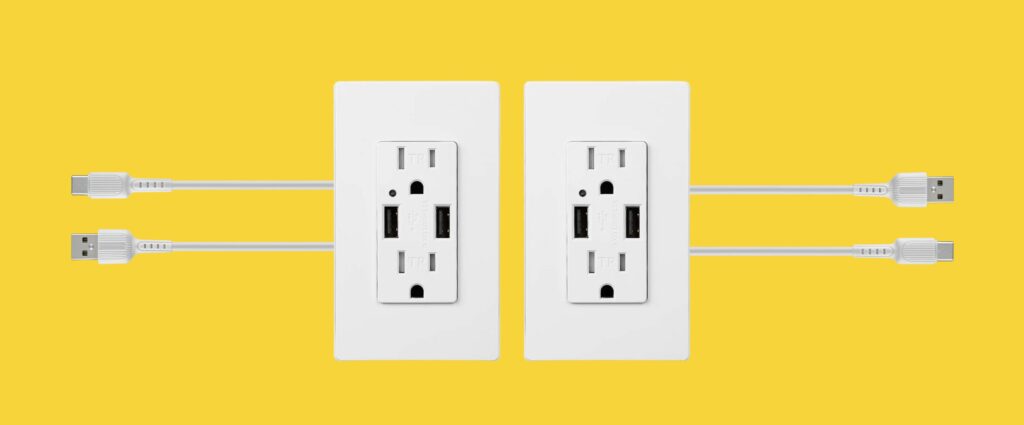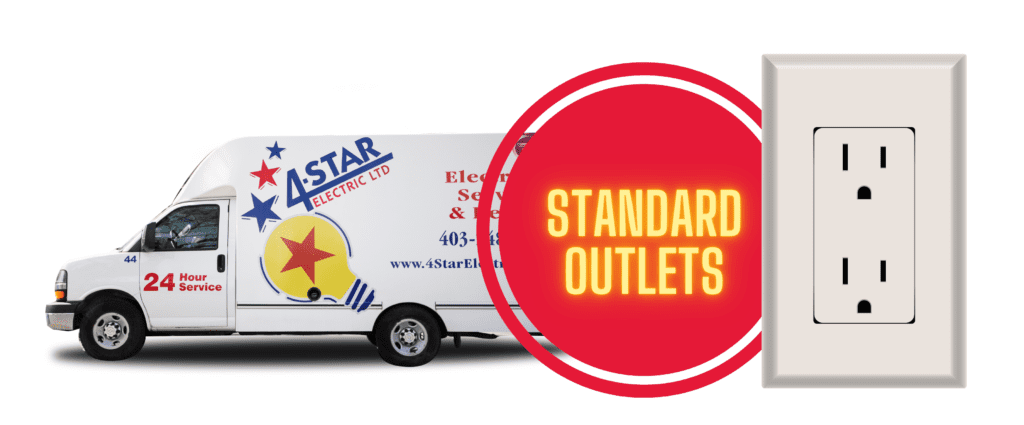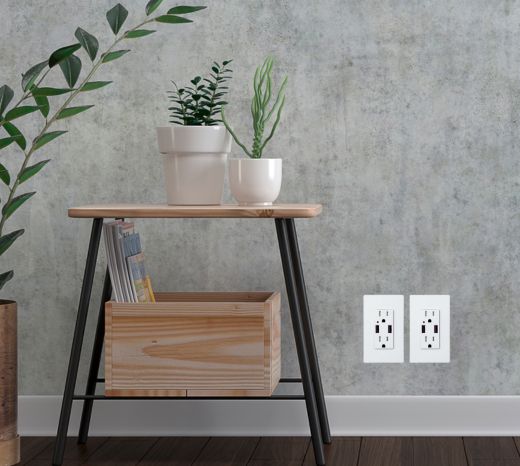The number of devices we plug in to use or charge every day makes the outlets in our home increasingly important—but many pieces of technology can’t be plugged into a standard three-prong outlet without USB adapters. USB-C adapters represent a solution to this problem, since they’re designed with ports that let you plug USB cables directly into your walls.
But how much do USB outlets cost, and are they right for you? Join us as we break down the pros and cons of these outlets below so that you can make an informed decision about whether to use them. With years of experience providing commercial and residential electrical services throughout Calgary, 4-Star Electric can help you decide on the best kind of wall outlets to have in your home.

USB vs. Traditional Outlets – What’s the Difference?
The chart below takes both the USB and the traditional outlet, and compares them against each other to showcase the differences between the two.
| Feature | USB Outlets | Traditional Electrical Outlets |
| Primary Use | Charging USB devices (phones, tablets, etc.) | Powering a wide range of electrical devices |
| Power Output | Lower power output, typically 5V DC for standard USB, higher for USB-C | Higher power output, usually 120V or 240V AC depending on the region |
| Compatibility | Designed for devices that charge via USB | Compatible with a broad range of electrical appliances and equipment |
| Installation | Can replace traditional outlets or be added as new installation; requires some electrical knowledge for installation | Standard in most buildings; straightforward installation process |
| Convenience | Eliminates the need for a separate USB adapter | Requires use of an adapter for USB-powered devices |
| Cost | Generally more expensive than traditional outlets | Less expensive compared to USB outlets |
| Versatility | Limited to USB-compatible devices | Highly versatile, can power appliances, lamps, computers, etc. |
| Physical Appearance | May have a combination of USB ports and traditional sockets | Usually have two or more standard electrical sockets |
| Safety Features | Often includes features like overcurrent protection for safe charging | Includes safety features such as ground fault circuit interrupter (GFCI) in wet or outdoor areas |
| Energy Efficiency | Can be more energy-efficient as it eliminates the need for a separate charger | Less energy-efficient for charging USB devices as it requires an additional adapter |
Fast Facts About USB Outlets
- Most USB outlets don’t only have USB ports—they include standard ports (just like a regular outlet) with additional USB ports located underneath or on the sides. The number of ports on USB outlets can vary depending on the specific model of outlet you purchase.
- Not all USB ports are the same. Older USB outlets are likely to have USB-A ports, whereas newer USB devices tend to use USB-C cables with smaller ports. If you are adding USB outlets to your home, it’s important to consider the types of devices you plan to plug into them and buy accordingly.
- Since USB outlets install the same way as standard outlets, they typically do not require upgrades to your home’s wiring or electrical panel. However, they do need to be installed by a qualified electrician—so if you’re upgrading to USB outlets, you should take the opportunity to check your home’s electrical system and make sure there’s no pressing work that needs to be done.
USB Outlets Pros
- USB outlets free up outlet space, since you don’t need to plug adapters into them.
- Devices usually charge faster through USB outlets than they do through USB adaptors.
- Removing the need for adapters or USB charging blocks reduces energy loss via phantom power, making your home more energy efficient.
USB Outlets Cons
- Older USB-A outlets may not be able to accommodate newer USB-C cables.
- USB ports may be more easily damaged than standard ports (due to plug design).
- Higher cost to purchase (many USB outlets can be purchased for $30-$50).
USB Outlets Are Ideal For
Home offices with numerous USB devices that need frequent charging or a steady supply of power, as well as commercial spaces.

Fast Facts About Standard Outlets
- Standard outlets provide 120 volts of electrical power for household appliances and devices.
- Ground fault circuit interrupter (GFCI) outlets are a type of standard outlet that protects against electrical shocks by detecting ground faults, which occur when electricity flows through an unintended path (such as through a person’s body). When this happens, the GFCI outlet diverts the current to ground, which can reduce or prevent electrocutions.
- Alberta homes are required to use GFCI outlets outdoors, and in kitchens, bathrooms, laundry rooms and where electrical shocks are more likely to occur.
- Homes built before 1962 may have outlets without ground wires. These outlets will only have two prongs instead of three. While all new homes have required three-prong outlets since 1962, it’s not technically illegal to have ungrounded outlets in your home—but since grounding helps prevents shorts (and the electrocutions that can result from them), you should strongly consider having an electrician upgrade any old outlets in your home.
Standard Outlets Pros
- Cheaper than USB outlets (many standard outlets can be purchased for under $10)
- Standard outlet ports can be less delicate and more durable than USB ports
- Less likely to be made obsolete since USB technology is still evolving
Standard Outlets Cons
- Must be connected to an adapter to charge or power USB devices
- Using an adapter slows down the rate at which your USB devices charge
- Older standard outlets may not have ground wires, creating a potential safety hazard
Standard Outlets Are Ideal For:
Rooms in homes where USB devices are less likely to need fast or frequent charging—for example, kitchens, laundry rooms, and other utility spaces will most likely have more standard appliances than USB devices in them.

What to Consider When Purchasing New Outlets (Standard or USB)
- Voltage accessibility: while 120 volt outlets are more than enough to power or charge typical household devices, it’s worth noting that the overall current will be divided between the number of ports on the outlet. Outlets with more ports can power more devices at once, but may not charge them as fast or supply sufficient power if the devices each require a high amount of voltage.
- Safety features: surge protection is recommended for all outlets, but can be especially important for USB ports since surges can easily damage the digital devices that usually plug into them. It’s also a good idea to purchase outlets that are tamper-proof, especially if you have children or pets.
- Always have new outlets installed by professionals: replacing an outlet might not seem like rocket science, but only a licensed electrician can safely and legally work on your home’s electrical system. Contact 4-Star Electric to find a certified electrician who can recommend ideal outlets for your home and install them properly.
Frequently Asked Questions About USB Outlets
How long does it take to install a USB outlet?
Installing a USB outlet takes about 20 minutes, give or take depending on the complexity of your home’s electrical systems.
How much does USB outlet installation cost?
The cost for installing USB outlets depends on the amount of outlets you are switching over and the complexity of your home’s electrical system. Call the experts at 4-Star Electric today for your no obligation quote.
Are there any guarantees on USB outlet installation service?
We are totally committed to your satisfaction. Our mission is to make sure you are satisfied with our work and our service. Once the agreed-upon electrical service has been completed, we will always ask for your approval before payment. Quite simply…
We do not accept payment until you are 100% satisfied with our work. We do our very best to exceed your expectations from start to finish every time!

Get Expert Advice From 4-Star Electric
Call the knowledgeable team at 4-Star Electric to install either your USB outlet today!
We have experience with all major makes and models, and can walk you through the best options for you and your home.
At 4-Star Electric, we’re Calgary’s electrical service leader. We ensure every customer finds trustworthy, timely, and reliable service, no matter what issue they’re experiencing.
We work within your schedule and offer services for both residential homes and commercial businesses. When you choose us, you’re treated like family.


